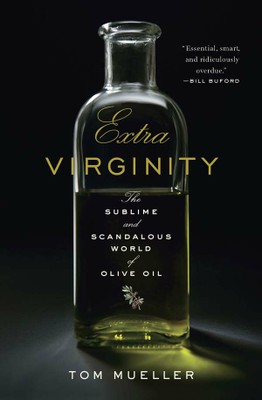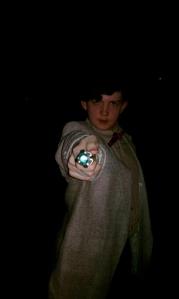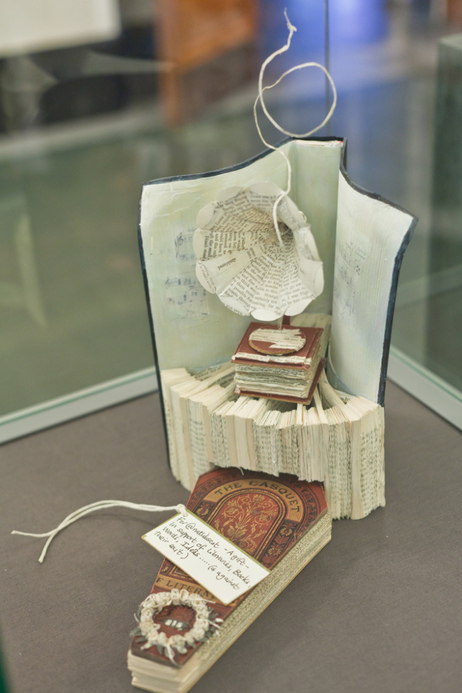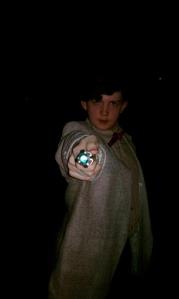What a week for trying to walk, talk, learn and think at the same time!
First, our 10-year-old son is listening to NPR in the car when he’s riveted by news of an important fossil discovery linking fish and land creatures, a so-called tetrapod, lifeforms that left the water to walk on land.
He isn’t interested in the news or politics, although he just
discovered Stephen Colbert and gets some of the comedy. He likes the
split screen where the contradictory wisecracks are on the right as
Stephen pontificates on the left. It reminds him of the wisecracking
moose commentary on the Brother Bear DVD.
But yesterday in the car, he suddenly wanted us to turn it up, so
he could hear all about the new fossil link. That was the first really
interesting “news” worth hearing, he proclaimed, but there wasn’t enough
to the story. (He actually said this, exactly that way, pronouncing
judgment like a seasoned media critic.)
Intense investigation ensues when we can get online, after which my little boy, who has never been made to think about anything, hugs me with a goofy grin and says, “Hello, my fellow tetrapod!”
Need I mention his reaction isn’t typical? – this news isn’t universally received as joyful revelation by the creationism-ID crowd currently in the middle of Lent.
The next day, our local university’s oceanography expert Doron Nof makes international news for his scholarly suggestion that Jesus could have left land to walk on water without violating science – if some of that water was in solid form, as ice sheets. Global warming backs up the plausibility of this as revelation rather than ridicule, but faithful in the media ridicule the idea of ice in a desert lake. (THAT’s the part they have trouble believing??)
“Nof and his co-authors are nonbelievers, but he denied they set out to debunk the walking-on-water story.
‘This is just what we say could have happened,’ Nof said. ‘How that fits into an individual’s system of beliefs, I don’t know.'”
He’s getting death threats every three minutes on average.
. . . a research professor of New Testament studies at the Dallas Theological Seminary, lightheartedly dismissed the idea . . .”Almost all the nature miracles are challenged in one degree or another. It’s usually a world-view issue about what someone thinks is possible. . .”
One e-mailer called him ”the most stupid person on the planet” and then closed by wishing that he ”go to hell where you belong.”
Do you want ice in that hell? What’s that you say? It’s easy to believe a literal hell that contradicts all science but impossible to imagine one with ice in it? It’s easier to believe God on earth if he DOESN’T follow the rules you believe he created for its operation, than if he DOES? Then why are the rules important in the first place, why are they absolute commandments, oh never mind, to my mind there’s no mind at all behind such unthinking, certainly not any divine one.
And now, my 16-year-old homeschooling college student of literature, musical theatre and comparative religion is thrilled to hear that the Gospel of Judas Iscariot has been discovered after 1700 years underground, in which she reads validation of the musical Jesus Christ Superstar, believing it reveals that Judas was faithful dupe rather than unfaithful renegade, and that Jesus as revolutionary leader understood much more about worldly matters such as politics and psychology than previous gospels suggest or Christian literalists will allow.
So does this week confirm or contradict the canon of our received “knowledge” to date, and have our minds evolved sufficiently to comprehend even the Known, never mind the Unknown?
“The debate is not over whether the manuscript is genuine — on this the scholars agree. Instead, the controversy is over its relevance. . .”
To think is to differ.
~ Clarence Darrow
Butler Shaffer who teaches about thinking and differing at the Southwestern University School of Law, writes today:
. . .Let us imagine that we are intelligent, rational beings, and that
someone makes an allegedly factual statement, the truth or falsity of
which is subject to the marshaling of evidence. How ought we to approach
such a statement, particularly if it conflicts with some
firmly-established, strongly-held belief of ours? Would we not insist
that this person substantiate his or her position with facts? Would we
not have sufficient confidence in our mental capacities to be able to
deal with an unpleasant or erroneous opinion? At the same time, would we
not – as intelligent persons – want to know whether that statement was true?
Then isn’t our paramount need to teach thinking that transcends one’s own values? What do we believe, what do we know, what can we do, about whether our schools and universities are up to the task of developing our intellectual capacities to think beyond what we think we know?
Harvard’s senior director of federal and state relations, Kevin Casey, said that he had “hoped and assumed�? that the commission would not ultimately endorse the suggestion to mandate standardized testing.
Casey said that American higher education is “the envy of the world.�?
“Part of it is because of the limited level of direct intrusion into curriculum by the government,�? he said.
Whew, no standardized curriculum, no standard answers – there must be an explosion of new discoveries and a lot of free-thinking in American higher education!
. . . most academics do not deny that there is a progressive, liberal bias in academe. . .
And while liberals may be more numerous, argues Schrecker, a professor of history at Yeshiva University in New York, that does not necessarily mean they are more powerful. “Progressive academe is like the ninth ward of New Orleans before the levees break – neither secure nor particularly safe. It’s one of the few areas left with some kind of progressive culture.” . . .Mark Smith, the director of government relations for the professor’s union, the American Association of University Professors, says that these broadsides vary according to the political climate.
The thinking lessons I take from this lecture-length column are not perhaps those the author intends. Progressive thought is failing to carry the day even in its own bastion, liberal academe? The culture now made up of college-educated thinkers has turned against what they were taught? And all these “envy of the world” university minds we charge with thinking for us all, define themselves as progressive but just cluster-flock into predictable subcultured comfort zones, rather than evolving to walk in radically different new ways through water, land, space, time and media — to seek and find, report, see and hear “news” differently than ever before?
How Sisyphean and slavish.
Dig a hole, fill it in, dig a hole . . .push that rock, tote that bale. Then eat your liver all over again. (oh, that last wasn’t Sisyphus, was it? but never mind, I earned my liberal education from a public bastion of progressive thought, so I needn’t feel constrained by the intellectual rigors of critical thought or knowledge larger than my own values.)
I had professors sure they were God or at least a god. The word gospel means “good news” but is this newly discovered gospel good news to teachers or students, of science or faith?
Here Jesus is said to entrust Judas with special knowledge and ask him to betray him to the Roman authorities. By doing so, he tells Judas, “you will exceed” the other disciples.
“You will be cursed by the other generations, and you will come to rule over them,” Jesus confides to Judas in the document, which was made public at a news conference at the National Geographic Society in Washington.
Maybe radically progressive academics could make room in their own culture of belief to learn from a new Jesus demonstrably smart about people and rules of power (Clint Eastwood as reluctant renegade in the movie Absolute Power or maybe In the Line of Fire – “I know things about people�? . . .)
Could they learn from it the hard reality of evolving, to break the surface of their college confines, leave their habituated underwater schooling for safety, and walk as individuals throughout the land breathing with lungs adapted to the atmosphere of their times, to someday rule over an authentically progressive culture?
In any case, my unschooled kids are thrilled this week with what they found to think about, thanks to some scholarly and independent thinkers walking independently on new ground while exercising unfamiliar limbs, without a thought for whichever school of thought claimed the power to keep them underwater in perpetuity, swimming as dictated by the construed greater good of their peer group.
So, if I just can keep them out of “progressive academe” at least until my own slapdash socio-demographic acculturation is better overcome by the example of their genuine learning —
maybe, just maybe, they’ll construct for themselves a truly progressive, truly independent education, and maybe someday that education will help them (and those of us who become their disciples) scientifically beget some miraculous future “tetrapod culture” in which all inhabitants sport fins, gills, limbs, opposable thumbs, curiosity, self-awareness, compassion and brainpower to spare, an evolved species in the perfect culture, capable of making connections and purposeful movement through all media, dimensions and disciplines as a new collective consciousness, for good instead of evil, amen. (Sounds like heaven!)
Which I believe, but cannot prove through science or academics, would put our current state of being to shame, no matter what miracles and revelations we found to think about this week.










Coffee Pots, Cameras and Other Words That Start With “C” Like Capital and Capitol
10 01 2012Washing up the coffee pot this morning, I mused about a good friend complimenting a couple of pots we shared over the holidays.
She returned to a grueling work schedule last week as most folks no doubt did, and had stopped in at a Starbucks for fortification during the latest cold snap. Expecting a little bit of holiday magic I suppose, she ordered up the same brand I’d served her — Cafe Verona. It disappointed her.
She later called to complain it had “tasted like ass!”
Why?
Same beans, same label, bigger and better equipment although I do have a built-in grinder that sounds like a jet engine revving for takeoff, plus Starbucks bean baristas are pros unlike moi, with training at making coffee that I’ve never sought or even thought about trying to match. I don’t take any particular pride of identity in my coffee — to me it’s a caffeine delivery medium, period. I take it hot and black and serve it that way too, unless lobbied by a special guest for special frills.
Aha! It hit me as I carefully washed out not just the pot but all the coffeemaker’s disassembled parts . . .
Could it be a question of “clean optics?”
Like camera lenses! Scrupulously clean optics are the secret to photography, or so I was taught by several fine photographers who tried to help me get the most from some fancy lenses I enthusiastically swapped out on my Nikkormat back in the 70s.
Good light and a good eye count, too. But even the best of both can’t compensate for the lack of squeaky-clean optics so that good light can pour through pure and true, where a good eye can make the most of it.
Coffeemaker cleaning is the same deal, I’ve learned (the hard way.) When oils from the coffee beans smear across even a little part of the mechanism and carry over into future production, the end product may indeed taste like ass.
Oh, it’s all very well to tout the beans and the roasting, the cost and the care with which the mechanism was created and is manipulated in the creative process. But clean optics are the key even though no one can see the difference. You can taste it.
I finished washing the pot and all the little parts, probably with even more care than usual.
Then I sat down with the last cup of coffee I’d saved from the pot before washing up, to watch the oiliest and most rancid governor in my personal half-century of Florida experience, giving his “state of the state” address to the oiliest and most rancid Legislative congregation of rich and selfish Capitol Capitalists assembled in my painfully experienced memory.
This is a fine state with good light and good mechanisms full of hardworking, vigorous and creative people.
That tastes more and more like ass.
Comments : 14 Comments »
Categories : Bullying and control, Cognitive Psychology, Corporate Culture, Creative Class, Cynical Stuff, education, Ethics and Philosophy, Family Values, Health, home, Human Networking, Institutions and Individuals, Journalism, Language, Leadership, Partisan Politics, Election News/Commentary, Political Frames, Power of Story, Propaganda, Public Communication, Rage, Reason, Religion, School is to Food, School versus Education, Separation of Church and State--the First Amendment, Standardized Testing, Taxes